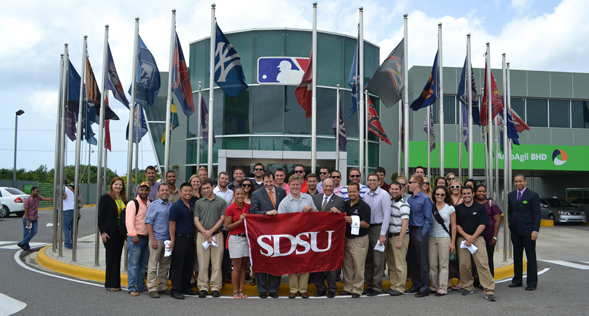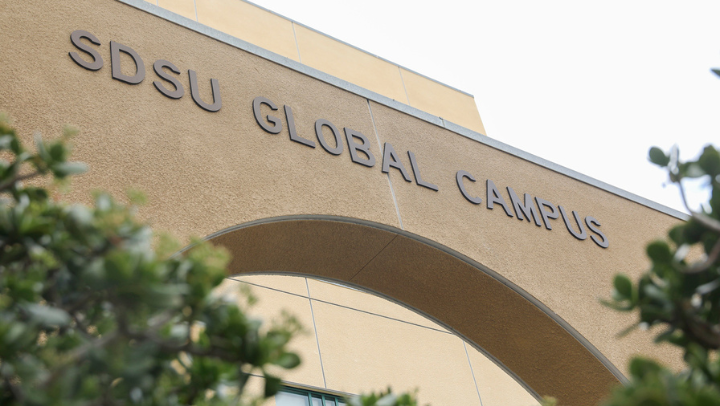Aztecs in the Dominican Republic
For the past five years, the SDSU Sports MBA program has traveled to the Dominican Republic to study how Major League Baseball operates internationally.

When visiting the Dominican Republic, you can expect to see three things — lush, tropical scenery, sunny skies and an abundant baseball culture.
For the past five years, the San Diego State University Sports Master of Business Administration program has traveled to the Dominican Republic as an extension of its International Human Resources course to study the country's vibrant baseball scene. The goal of the nine-day program is to observe how Major League Baseball, a United States corporation, runs its international acquisition and training of Latin American players.
"As much as we learned about the state of the country and the sport before the trip, nothing compares with actually experiencing it as we did throughout our journey," said program participant Michael Schwartz.
Through MLB office visits, meetings with top executives, observing how the executives conduct business and interacting with prospective and current players, participants are able to get a comprehensive view of the baseball culture in the Dominican Republic, which has been an epicenter for top baseball talent more than a century.
"This isn't a baseball trip — it's an international business trip," said Scott Minto, director of the Sports MBA program. "We look at the entire spectrum of baseball's impact on players, as well as the community."
A vibrant baseball culture
For many young, aspiring players in the country, baseball is seen as an escape from poverty. Approximately 62 percent of Dominican Republic citizens live below the poverty line, with 33 percent living in extreme poverty.
The dynamic baseball culture of the Dominican Republic thrives on young players. With so much pressure to succeed, players often turn to performance-enhancing drugs and identification fraud to improve their chances for selection.
Because signing Latin American players is less expensive for the MLB, high-talent, low-cost players are in high demand, according to Minto. Most are signed to an agent at age 16, and typically don't have more than an elementary education.
"Baseball is their life," said Jennifer Bulcao, Sports MBA program coordinator. "To sign at age 16, you have to start preparing as a young boy."
Young players also carry the weight of supporting their families through their baseball successes. "Not only do the players have such high expectations of themselves, their families expect a lot as well," Bulcao says. "That check could be what helps them survive."
Program goals
Through visits to MLB team training facilities and seminars conducted by league officials, the program participants acquire an understanding of the player development process in the Dominican Republic.
The program's unique focus looks at things from both an MLB perspective, and from that of a global citizen.
"We really want to give the students perspective on where these players come from and the struggles they face to succeed," Minto said. "It really exposes students to the reality of the situation."
An additional component of the program compares and contrasts the ways different businesses operate in different countries.
Partnering with the Padres
Since 2005, the San Diego Padres and the SDSU Sports MBA program have worked together to form the first partnership of its kind.
Each year, students participating in the trip are able to visit the Padres' developmental facility in the Dominican Republic. There, students take classes in international business and international human resources and explore ways that regulation, legislation and oversight can reduce negative impacts of the MLB's presence.
A rewarding experience
Each year, the program selects a community service project to perform throughout the course of the nine-day trip. This year, participants re-painted a community center, Espacio Para Crecer in Najayo that caters to children ages 8-16.
Minto strives to provide a more than temporary solution to communities each year.
"We put a coat of paint on that community center, but what does it really mean? What are some things we can do to invest and look at this from an MBA angle and think, what sustainable projects are there? What can we do that's not a strict donation? And we let the students come up with those ideas themselves."
The trip organizers emphasize the importance of education to students.
"We had a Spanish-speaking student address a group of kids aged 6-16 at a training center, and he told them all the benefits of education," Minto said. "They could be sports agents, work for a team, or at an academy. Baseball isn't the only option."
Bulcao added, "No one is teaching these children about the importance of education — these are new ideas to them."
Moving forward
The Sports MBA program recently received an SDSU President's Leadership Fund grant to expand the program.
Now the program will be extended to include women's volleyball, which is similar to baseball in terms of opportunities to flee from poverty. The Dominican Republic consistently has one of the top women's volleyball programs in the world.
"Our goal is just to be a role model for the communities we visit," Minto said. "We want to be teachers more than coaches."



